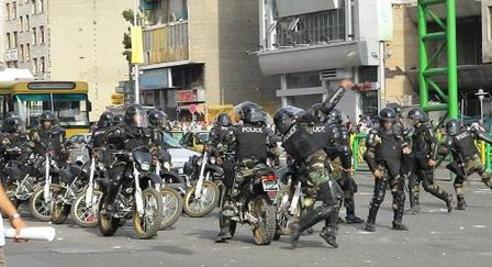A backstage struggle among Iran's ruling clerics burst into the open Sunday when the government said it had arrested the daughter and other relatives of an ayatollah who is one of the country's most powerful men.
State media said the daughter and four other relatives of former President Hashemi Rafsanjani were released later Sunday but their arrests appeared to be a clear warning from the hardline establishment to a cleric who may be aligning himself with the opposition.

Tehran's streets fell mostly quiet for the first time since a bitterly disputed June 12 presidential election, but cries of "God is great!" echoed again from rooftops after dark, a sign of seething anger at a government crackdown that peaked with at least 10 protesters' deaths Saturday.
The killings drove the official death toll to at least 17 after a week of massive street demonstrations by protesters who say hardline President Mahmoud Ahmadinejad stole his re-election win. But searing images posted online – including gruesome video purporting to show the fatal shooting of a teenage girl – hinted the true toll may be higher.
Police and the feared Basij militia swarmed the streets of Tehran to prevent more protests and the government intensified a crackdown on independent media – expelling a BBC correspondent, suspending the Dubai-based network Al-Arabiya and detaining at least two local journalists for US magazines.
English-language state television said an exile group known as the People's Mujahedeen had a hand in street violence and broadcast what it said were confessions of British-controlled agents in an indication of the government, vilifying the opposition, ready to crack down even harder.
Opposition leader Mir Hossein Mousavi warned supporters of danger ahead, and said he would stand by the protesters "at all times". But in letters posted on his allies' Web sites Saturday and Sunday, he said he would "never allow anybody's life to be endangered because of my actions" and called for pursuing fraud claims through an independent board.
The former prime minister, a longtime loyalist of the Islamic government, also called the Basij and military "our brothers" and "protectors of our revolution and regime." He may be trying to constrain his followers' demands before they pose a mortal threat to Iran's quixotic system of limited democracy constrained by Shiite clerics, who have ultimate authority.
His chances of success within the system would be far higher if he has backers among those clerics.
In the clearest sign yet of a splintering among the ayatollahs, state media announced the arrests of Rafsanjani's relatives including his daughter Faezeh, a 46-year-old reformist politician vilified by hardliners for her open support of Mousavi.
State media said Rafsanjani's relatives had been held for their own protection.
"That is a major escalation and ratchets up the conflict with Rafsanjani," said Michael Wahid Hanna, a regional affairs analyst with the Century Foundation, a New York think tank. "It really raises the stakes."
Rafsanjani heads the cleric-run Assembly of Experts, which can remove the supreme leader, the country's most powerful figure. He also chairs the Expediency Council, a body that arbitrates disputes between parliament and the unelected Guardian Council.
Rafsanjani and his family have been accused of corruption by Ahmadinejad. And the 75-year-old ayatollah was conspicuously absent Friday from an address by the country's supreme leader calling for national unity and siding with the president.